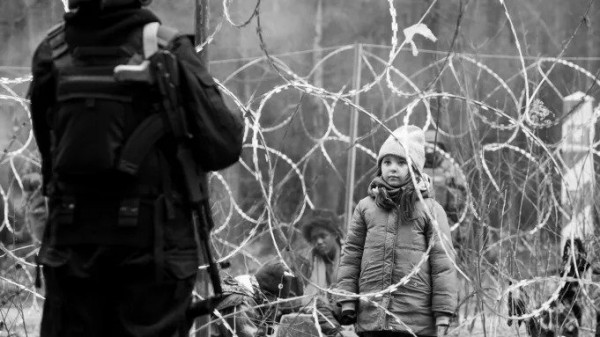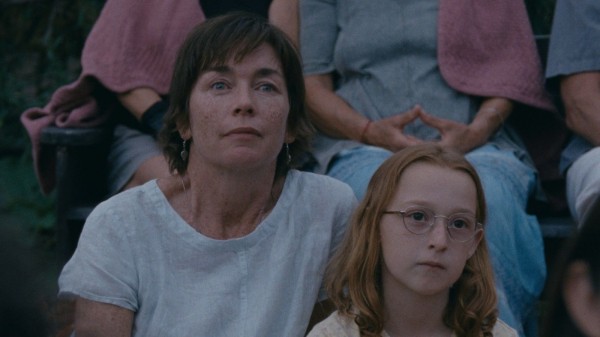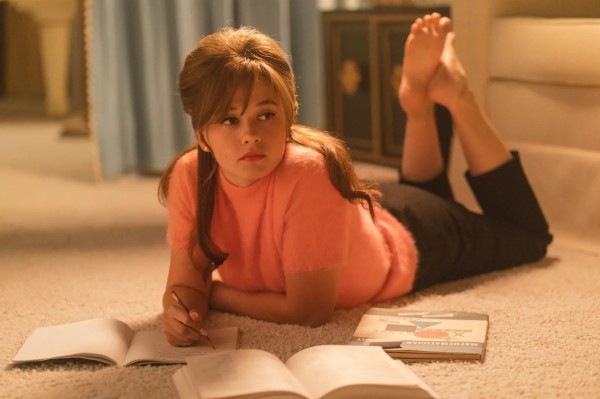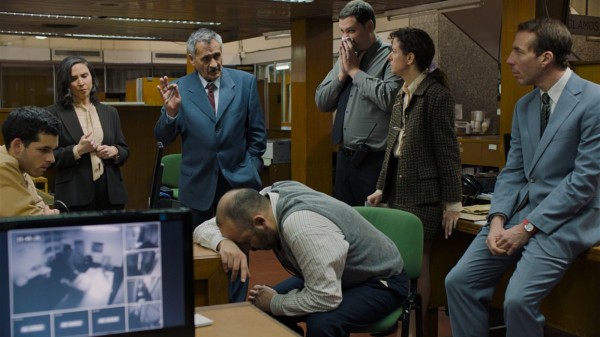-
GREEN BORDER (Agnieskza Holland 2023)
AGNIESZKA HOLLAND: GREEN BORDER (2023)

STILL FROM GREEN BORDER
Refugees treated as pawns by brutal authoritarian leaders across the Polish-Belarus borders
Agnieszka Holland's harrowing new film is a closeup of a piece of the world refugee crisis from multiple viewpoints. Helped by two other directors, Kamila Tarabura and Katarzyna Warzecha, she crafts a docudrama focused primarily on a Syrian family, father, mother, grandfather, kids, young sister, and a single bespectacled Afghan woman who speaks English, not Arabic. We meet them on a Turkish plane and the Arabic speakers naively think they can go through Poland to Sweden, where the family have a relative living. The Afghan lady wants instead to be given refuge in Poland. Instead they become pawns in a brutal game.
When they get to Belarus, and take a taxi prepaid from Sweden to Poland, they wind up first extorted, then tossed back and forth across a barbed wire line camping precariously in the woods - the "green border." The two ultimate villains behind their cruel treatment are Alyaksandr Lukashenka, the dictatorial leader of Belarus, and the no more admirable Polish leader Andrzej Duda. The brutality with which they are treated by the guards on both sides, the suffering of the young children and older man, are difficult to watch. In an omnibus review from Toronto, Brian Tallerico calls this film "a movie that many people probably couldn’t get through, but they probably should."
Holland and her cowriters Maciej Pisuk and Gabriela Lazarkiewicz have more up their sleaves, and they shift their focus for a while, after the mistreatment of the refugees has become impossible to watch any more, to others in the equation. There is the young Polish guard, Jan (Tomasz Wlosok)and his pregnant wife (Malwina Buss). The parallelism is a little too obvious since there are several pregnant women among the refugees subsequently shown, one of whom, an African woman, gets particularly brutal treatment. We see the young Polish guard with his wife. Then Jan is present for a pep talk from an officer who says the refugees are being used as weapons by Belarus’ President Alexander Lukashenko and Russia’s Vladimir Putin; he encourages the guards to treat them as objects and regard them as scum. But Jan starts to drink heavily and suffers psychological torments from this job, though he refuses to quit, thinking thework a national duty.
Another of the fragmentary "chapters" takes us to "activists," who seek to help the refugees in the "green border" forest interzone without breaking laws. But we also follow a woman shrink Julia (Maja Ostaszewska), a recent widow whose two dogs are her main emotional contacts. She joins with the activists, but her conditioned empathy, and perhaps a sense of privilege and the lack of immediate family she needs to protect, lead her to break the rules and take outsized risks, causing her own temporary arrest and making her too visible to provide haven for refugees in her ample hous.
There is a memorable sequence where some young French-speaking African boys are taken into a posh Polish house and sing rap with a Polish kid. Showering and dressing beforehand, they realize they "smelled bad," but, once cleaned up, they have enough juice left to enjoy themselves and bond. However in another brutal episode, some of the original group get mired in a swamp and children die - a sequence as painful to witness as the brutal beatings earlier.
It sometimes feels that this intense, well-staged, well-photographed film has attention deficit disorder. Boyd van Hoeij, writing from Venice for The Verdict, is not happy with the film's structure. He considers Green Border to be "hindered by" both "extremely predictable character development" and "a mosaic-like approach to narrative," that impairs our ability to "really get to know" or "emphasize with" any of the characters.
Krzysztof Kieślowski's "Three Colors" trilogy shifts around somewhat this way to compelling effect: it's just hard to do and requires a certain panache. Another multiple plot composition that succeeds impressively is that of the 1989 British miniseries "Traffik," where action switches back and forth between Afghan and Pakistani growers, dealers and manufacturers, German dealers, and British users. "Traffik" does this with a sense of drama, of art, and of entertainment. The writing of Green Border isn't on that level; isn't equal to its authenticity of mise-en-scène and casting, its awareness of current politics, and its moral sense. We feel deeply for the suffering of these abused and toyed with human beings, and we wish Green Border were as well made as it is urgent.
Recent Holland films I have reviewed are Burning Bush, Spoor, Mr. Jones, and Charlatan. An earlier favorite is the one about Rimbaud, Total Eclipse, for its go-for-broke performance by the young Leonardo DiCaprio; and, of course Europa Europa. Recently she has done a lot of television, including several episodes of "The Wire." Green Border is a TV series hastily assembled into a feature film.
Green Border/Zielona granica, 147mins., debuted at Venice (where it received the Special Jury Prize), also featured at Toronto, AFI, New York (where it was screened for this review Oct. 4, 2023) and Chicago. At the NYFF is shows Oct. 4 and 5, including Q&A's with Agnieszka Holland. Metacritic rating: 8̶5̶%̶ 83%.
Last edited by Chris Knipp; 03-06-2024 at 11:08 AM.
-
PICTURES OF GHOSTS/RETRATOS FANTASMAS (Kleber Mendonça Filho 2023)
KLEBER MENDONÇA FILHO: PICTURES OF GHOSTS/RETRATOS FANTSMAS (2023)

INTERIOR OF A RECIFE PICTURE PALACE IN ITS HEYDAY FROM PICTURES OF GHOSTS
Haunting images and haunted places: the Brazilian director explores the sources of his inspiration
Menconça Filho memorably and spookily followed a world of menace and disorder in new Recife buildings fictionally in his 2011 debut feature Neighboring Sounds (ND/NF 2012). This time he crafts, with old footage, much of it his own, a personal documentary about fading remnants of culture in downtown Recife since the picture palaces, once idyllic places, went dark, preceding this by a pictorial review of family apartments, where he has shot his films over the years. Thus he flows from thoughts on his own movie-mad youth and his own family above to an eelegy for the lost communal culture of shared moviegoing - and what cinema owed to cinemas, and has lost as film "going" goes electronic and digital and solitary.
Speaking of apartments, Mendonça Filho's second, and more widely known film was Aquarius (NYFF 2016), which is about an imperious woman, magnificently played by Brazilian superstar Sonya Braga, who won't give up her apartment to developers. In speaking of this film, less structurally inventive than Neighboring Sounds, I said the film "shows how the apartment has acquired through decades of human use the quality of baraka as Robert Graves defined it in his Oxford Addresses on Poetry."
Mendonça Filho does this in even more detail, with lots of film illustrations, in talking about the family apartment, which remained occupied by him for forty years, and went through two major. remodelings, but still doubtless retained the underlying baraka from decades and decades of family use. Initially, when we see the old interior of the apartment, it's dark and cozy. We keep going back over it, people in it, his mother, siblings, the balcony and people watering the plants outside. We see and hear a lot about the apartment next door, with its swimming pool. It was invaded by termites, which caused the roof to collapse and got into the director's family apartment too. Off in the distance is the sea, and the big apartment buildings that have grown up as Recife has grown. All this is narrated in Mendonça Filho's own voice. And he tells us how he made movies here, with this apartment as the location, not just juvenile efforts but also mature work.
The film's second part shifts to Recife's city center, now in decline, and the handsome cinemas that once were important places of entertainment there. This section of the film is partly about cinema, partly about urban decline, partly fond memories of specific places, homes away from home if you like, inspirations and almost places of worship for young cinephiles and cineastes. Detailed visual explorations of the places, some archival, some Mendonça Filho's own footage shot over years, also include his visual records of Mr. Alexander, chief projectionist of one of the biggest theaters, whom the director filmed prior to his death two decades ago. While old movie palaces in America, most of them gone, tended to the baroque, those of Recife seem to have been of later vintage and more clean and modern-looking. Many were torn down and replaced by other buildings, some were converted into shopping centers - one, even while it was still a movie theater.
Mendonça Filho's skill is in creating magic, mystery, and fearful haunting out of the ordinary - a neighborhood or a long-inhabited family apartment. He does something like that in a coda to this evocative, richly personal documentary in which he takes a ride with a driver who tells him he has discovered a superpower: the ability to become invisible in place. And voilà! he finds himself in a driverless car. But no! The driver is still there, you can hear his voice. Simple, artisanal movie magic is the best way to haunt the viewer and plant lasting memories.
Mendonça Filo has crafted a most personal and original set of recollections. This splendid documentary confirms and elucidates his distinctive vision and whets the appetite for another feature, while providing one of the best guides to his work future students will ever see.
Pictures of Ghosts/Retratos Fantasmas ("Ghost Portraits," "Phantom Portraits"), 93 mins., debuted in May 2023 at Cannes Special Screenings. It was screened for this review as part of the New York Film Festival, where it shows Oct. 9, 2023 at 5:30 pm.
Last edited by Chris Knipp; 09-18-2024 at 06:40 AM.
-
JANET PLANET (Annie Baker 2023)
ANNIE BAKER: JANET PLANET (2023)

JULIANNE NICHOLSON AND ZOE ZIEGLER IN JANET PLANET
"Once again, A24 gambles on an unproven filmmaker, and once again, the indie studio comes away with an incredibly specific and personal glimpse into the mysteries of childhood." Peter Debruge, Variety. (Telluride.)
It has understandably received raves from reviewers for the major trade journals, but there are things that work and things that don't in this quirky and original directorial debut by the Pulitzer playwright Annie Baker in this portrait of a single mother and her perceptive but clingy 11-year-old daughter as they share summer '91 in Western Massachusetts - which hints at autobiographical elements. The intimate, precise little details of dialogue and boogers, hair lumps or a captured and executed tick and the score-free and pause-rich pace capture this world. But The Wrap's review by Tomris Laffly sums things up when it states that this A24 movie is "textured but wearisome." Janet Planet, as Peter Debruge writes, "is oddly structured and a bit flat (there’s no score, and the camera rarely budges)."
The odd structure is various, but starts with the question: who is this movie about? It's as if Baker couldn't (or wouldn't?) decide. At first all the focus is on the little girl, and you assume she must be Janet. But the little girl is plain, red haired, gold-rim-spectacled Lacy (Zoe Ziegler, spot-on). She gets taken out of summer camp early, apparently, because she thought nobody liked her, but as she waits to get picked up by Janet, who is her freckled mother (Julianne Nicholson), two girls are waiting to say goodbye and Lacy has got friends after all and would like to stay. But mom says no, because, for one thing, the camp has "agreed to return part of the deposit." (Janet is way off in the distance in this shot, by the way.)
The rather dry humor of this moment, which typically involves notable waiting and silences (and the aforementioned fixed camera position and lack of score), impresses for its own sake: it's a little showoff-y. It establishes the almost adult rapport of Lacy with Janet. This continues when Janet asks what she should do about her current boyfriend, Wayne (Will Patton), whose weird nighttime interpretive dancing (if that's what it is) and his prima donna behavior around a migraine, can't be cured by Janet's acupuncture treatment (use of curative needles being her livelihood, we learn). Janet asks Lacy what to do about Wayne. Lacy immediately advises to get rid of him. So again: whose planet it this? Maybe we should just say this is Annie Baker's planet and be done with it.
But it is "Janet's Planet" in that people come (and soon go) to be with Janet. This is signaled by inter-titles. Thus comes "WAYNE END." Then comes "REGINA" followed by "REGINA END." Regina (Sophie Okonedo) is an old friend Janet hasn't seen for years, who's out of dough and needs a job. Regina is met at a colorful, oddball group performance (tall, giraffe-like fantastical human-powered puppets; choral chanting) by a sort-of-cult led by a man called Avi (Elias Koteas), which Regina leaves to avoid Avi's clutches, to stay for a while with Janet and Lacy. But then, Regina gone after a spat, there is an inter-titled arrival of Avi himself in "Janet's planet," and he gives a little lecture (typically to Lacy as well as Janet) about the origin of the universe in Buddhist terns, something you could get in fuller form from an Alan Watts lecture recording. Janet, with Lacy's permission, goes on a walk and a country picnic with Avi. Hey presto! Avi vanishes in the middle of reciting a poem. AVI END.
A square dancing gathering is "a great way to meet people," so Janet goes to one, another seemingly authentic local event included in the film. Poor Lacy sits on the sidelines, refusing to dance and so lonely she wants to cry.
If you want to know where all this is going, perhaps the best answer is back to school for Lacy, whose entry into the sixth grade (with the "nice" homeroom teacher, we are happy to hear) is temporarily delayed when she gets sick. She almost throws up; yes, she's scared about going back to school but that isn't what made her sick. She lies on the floor and on the ground outside for a while. She refuses to take antibiotics and then apparently does take some.
This is a movie that seems almost to diminish in the mind afterward. Its slow scenes demand attention. It's observations are precise. Its style is distinctive enough to warrant adjectives like "exquisite" and "indelible" from prominent critics. But its episodic structure and lack of clear central focus leave one feeling it seem to collapse into itself and vanish, the way Avi does. Janet's periodic self-analysis, with conclusions that she's self-sabotaging, yet can easily captivate people, seem uninteresting, and not even true. But remember, this is an original and keenly observed film.
Janet Planet, 113 mins., debuted at Tellluride Sept. 1, 2023. Screened for this review Oct. 5 prior to the New York Film Festival Oct. 8 showing. Metacritic rating: 92%.
Last edited by Chris Knipp; 10-05-2023 at 04:44 PM.
-
PRISCILLA (Sofia Coppola 2023)
SOFIA COPPOLA: PRISCILLA (2023)

CAILEE SPAENY IN PRISCILLA (JACOB ELODI PLAYS YOUNG ELVIS) ]
TRAILER
The protected world of Elvis Presley's child bride.
Sixteen months ago we had Baz Luhrmann's lively but flawed Elvis with Austin Butler. This is something less obvious: the woman's angle, Elvis seen crabwise and through jaundiced eyes from the point of view of the child bride, with two excellent unknowns in the leads, breakout young Australian Jacob Elordi as Elvis and Missouri-born Cailee Spaeny as Priscilla. This, like Bradley Cooper's Maestro, is a portrait of a famous musical artist's flawed marriage, but this time all the spotlight is on the wife.
The thing that's most striking about Priscilla is how immaculate it is, how correct and polite everyone is. This film was shot in Canada, not on the biggest budget, in thirty days, and it's neat, tidy, with no rough edges, and so much the better for it - but do not look for grand scenes; some have complained that it's about nothing happening, a Waiting for Godot celebrity marriage, as it were. There are a couple of fights, when Priscilla has gotten too fed up with her situation to repress it, and Elvis is rough with her once when she seems uncooperative. But from the start he calls her "darlin'," and is sweet and tender. Warning: he is delicately objectifying her.
Sofia Coppola's elegant, restrained film lets things creep up very slowly, and even Priscilla's departure when she leaves Graceland for good in the film's final moment is quiet and discreet. All this shows how well Coppola's collaboration with her subject works. The film is based on Elvis and Me, Priscilla’s 1985 memoir of the marriage, but also on recent communications, and notably the living Priscilla, who was in touch with the director, was tearfully present at the Venice premiere and gave her blessing and said the filmmakers had "done their homework."
The two future lovers meet in 1959, a time of uniforms and dazzling big cars. Elvis arrives in a long black wing-tailed Cadillac that is to die for. Priscilla was 14, a ninth grader, and Elvis is 24, famous, already the world's number one rock superstar, with a constant entourage, but in the US Army. Both are in Germany, where Priscilla's stepfather, like Elvis, is stationed nearby, with the Air Force. Elvis, entranced by the girl's prettiness and the hometown Americanness he misses, arranges for the girl to come again, against the objections of the stepfather, who is carefully persuaded.
Jacob Elordi, who plays Elvis, is soft-voiced, often in shadow, as if to show the quietness of his menace, or to emphasize that this is not his story but hers. He is very tall (the actor is 6'5"), hovering above, pale, immaculately coiffed. Unlike Austin Butler, he doesn't get to do any leg-wobbling, hip-shimmying showoffs. No performing. He is just Priscilla's rich and incredibly famous husband who is dominant, controlling, and mostly away. Hie Elvis is as subtle and elegant as Austin Butler's is giddy and crowd-pleasing.
The dating period is sweet and tender. Priscilla falls in love. Elvis tells her she is special, "from back home," a comfort to him. But then when he goes back to the States and she remains in Germany there is a period when she thinks he has forgotten her. He has not, though. Again, true to the style of this film, what stands out is how smoothly everything goes; and how, astonishingly, he gets her stepfather, again reluctantly, to allow her to go and live at Graceland, continuing her schooling there. His bedroom is dark and elaborate (the filmmaker's invention: they found few records of Graceland's early interiors).
Priscilla now has a strange status that Peter Bradshaw describes in his Venice Guardian review as "infant sacrifice, bobbysoxer concubine," she is on hold, tenderly spoiled and cuddled - but no sex, at least not the "penetrative" kind, or any that we see - awaiting her moment to become the "child bride." Sofia Coppola's delicate staging defines this slowly evolving, rather strange status, strange to see so clearly defined in a movie, probably still much experienced in more traditional cultures even today, but far from the rom-com world. This is were Priscilla excels, and is memorable. It is also made clear even from Priscilla's first installation that Elvis is taking a lot of pills, uppers and downers, and sharing them with her. (The first time he gives her a downer, she sleeps for two days. He miscalculated.)
Priscilla goes to a Catholic girls school taught by nuns to finish high school. She is not a good student: she is too distracted by Elvis' nocturnal existence and she is warned by the head nun that she's in danger of not graduating. But when Elvis comes and visits the school - in one of the movie's few laugh-out-loud scenes - the nuns crowd around him, big fans like everybody else. Priscilla has persuaded him to wait outside for her graduation because his presence would have drawn all the attention.
It's only after a considerable time in this ongoing "bobbysoxer concubine" status that Elvis is ready to marry Priscilla. It's not stated but she is by then twenty-one, he, thirtyish, and right away there is a baby. But, of course, Elvis has been away much of the time: this was the period when he was making a lot of movies, whose kitsch B-picture quality he complains of; it's known that he had quite good taste in film, and he always wanted to study at the Actors Studio and seek a serious movie career like Brando and James Dean.. But Priscilla has a different complaint about Elvis' time in Hollywood: his wildly publicized affairs, notably Ann Margaret and Nancy Sinatra, which he pooh-poohs. Bradshaw says Priscilla has become "Memphis’s very own Lady Diana," with female Hollywood stars "in the Camilla Parker-Bowles role." Whatever is going on in Hollywood, Priscilla isn't a part of it.
Coppola's film is immaculate and delicate, but it will only be succeeding if it makes you uncomfortable. Most of all it will make you feel the frustration, the claustrophobia, the boredom of Priscilla Presley's confined life. She is never allowed to go on the bus to Hollywood, or performances, with the gang of male sycophants: she watches as it departs. She is not even allowed to play outside on the lawn. All her llfe is waiting, waiting, as she first got as strong taste of when Elvis left Germany and for a long time he didn't call or write.
For this reason this movie is not for everyone, and Austin Butler's jazzy performance in an inferior but entertaining movie will be an Elvis that's more fun and more the Elvis you want to remember. But this, like Cooper's Maestro, is a classy and unexpected portrait of an artist celebrity marriage. Priscilla is more critically acclaimed. But Maestro is a richer, more complex story and more intellectually stimulating. This film however is very germane to Coppola's interests. It has strong ies with Marie Antoinette and with her 2010 portrait of urban celebrity anomie and isolation, Somewhere. But Priscilla is more successful and has more mainstream appeal. It's up there, but not on the level of Lost in Translation or The Virgin Suicides.
Priscilla, 113 mins., debuted at Venice, where Cailee Spaeny won the Best Actress award. It was also shown at Zurich, New York, London BRI, Mill Valley, and some other festivals. Featured as the Centerpiece Film at the New York Film Festival, where it was screened for this review Oct. 7. US theatrical release is scheduled for Nov. 3. Metacritic rating: 82%.
Last edited by Chris Knipp; 10-09-2023 at 06:30 AM.
-
neosora: RYUICHI SAKAMOTO (Neo Sora 2023)
NEO SORA: RYUICHI SAKAMOTO | OPUS

A filmed solo concert with the artist, who died at 71 in March of cancer. Venice.
Last edited by Chris Knipp; 09-15-2023 at 09:40 PM.
-
Lisandro Alonso 2023)
LISANDRO ALONSO: EUREKA (2023)

IMAGE FROM LISANDRO ALONSO'S EUREKA
TRAILER
Three stories of indigenous people, at different times and places
With VIggo Mortensen and Chiara Mastroianni in the first section, featured in the neutral Premieres category at Cannes (not making it into Competition there), this is a bit of a puzzler. Though each of the segments is interesting - or contains interesting - and suspenseful - elements, it's hard to figure out how they connect, which they seem to be meant to do, since each one merges into the one that follows.
"The Argentine slow-cinema formalist explores tensions between Indigenous culture and the modern world in a languid curio that will delight his acolytes and bemuse others," write Guy Lodge in Variety at Cannes. A review by Savina Petkova for Playlist, perhaps best states the case when she says "there’s too much" here "to make it really work." But it's exciting to try, and I like this better than his much admired last film and find much to admire in it.
Lisandro Alonso's 2005 Los Muertos is one of my favorite Latin American films, favorite films ever seen in a film festival, so I have enormous respect for this director and know the power he wields. Los Muertos is a film that is almost wordless. It;s perhaps right to say that here, in this new film, Alonso has too much going on. It's the opposite of Los Muertos, which is one man, no dialogue, no score, just a camera and a jungle journey to a violent finale whose meaning we understand without explanation. I was disappointed by Alonso's more mainstream (but also quaintly formatted) 2004 Jauja, his last film and his biggest "hit" so far. It was accomplished and that academy ratio format with curved edges gave it an art house elegance, but it lacked his earlier edge.
The opening of Eureka is oddball and amusing. It's rough-hewn black and white Western opening with a scrawny, ancient Native American delivering a thrilling cry to the elements; then featuring Viggo Mortensen as a lonely traveler çalled Murphy, whom others seem to have it in for, searching for his kidnapped daughter: he is dumped off a coach by a surly driver dressed like a nun. They speak English, anachronistically, since it's the nineteenth century and she talks about having to get to her kid." In a saloon, Chiara Mastroianni - you won't see this again - sits down with him and says he can call her "El Coronel". Apparently, she runs the unruly town. There's something of the off-key air to this stylized Western passage of Jum Jarmusch's Dead Man, without being quite as authentic or as brilliantly weird. Then the camera pulls away to reveal a big boxy TV with the last image on the screen: hey presto! We've been watching a TV movie.
What follows at first features a Native American girl called Sadie (Sadie Lapointe), neice of Alaina (Alaina Clifford), a Native American cop in the Pine Ridge Reservation. We follow Alaina around as she carries out bureaucratic white people police duties like arresting a (pregnant, 15-year-old, drunk) Native American girl fighting with a knife, and rescuing a stranded European motorist called Maya (Mastroianni again). Alonso plays with the slow-cinema possibilities of cop routine, the calls back dnd forth to HQ - where Alaina apparently disappears after going to the casino to investigate the remains of a brawl.
This artfully segues into Sadie going to the station/jail to visit her brother, whom she seeks to motivate. She first appears as a basketball player and coach, and seems full of energy and hope. But she goes to her granddad, and reveals she wants him to carry out a promise he made to her long ago: she wants, it seems, to disappear, or to fly away in the soul of a giant stork. Mays's question to Alaina about teenage suicide may have been gauche, but desperation reigns even among the apparently motivated, on this American Indian reservation.
That's it for North America and we're transported to the Amazon basin, where the bird-soul flies, and an earlier time again, where Indigenous Brazilian natives read each other’s dreams and one of them, banished by stabbing someone in a knife fight, goes to work foraging for gold, meeting his own bizarre fate witnessed by the giant bird.
This is all magnificent, especially the haunting passage of the cop on the reservation, and it's beautifully photographed by Timo Salminen (an Aki Kaurismaki collaborator) and Mauro Herce Mira, and fluidly edited, by choice flowing seamlessly like an acid trip instad of neatly separated into chapters.
But either way, flowing or in chapters, these segments are hard to digest in one two-and-a-half-hours film. It did not seem long to me, only confusing, a piece of work of high polish with an interesting cast, both famous and unknown, a film that you can write a nice essay about but that's hard to wrap your head around, and hard to recommend to anybody but challenge-seekers or dyed-in-the-wool Lisandro Alonso fetishists. But if you are one of those two, for God's sake see this whenever you get the chance.
Eureka, 140 mins., debuted in Premieres at Cannes May 2023; also shown in festivals at Munich; Wroclaw, Poland; Lima; Melbourne; Busan; and the New York Film Festival, as part of which is was screened for this review Oct. 10, 2023. Metacritic rating: incomplete, including only one review so far. NYFF: Oct. 10 & 11, 2023, Q&A with Lisandro Alonso, Alaina Clifford, Sadie Lapointe; N.American premiere.
Last edited by Chris Knipp; 10-10-2023 at 10:09 PM.
-
THE DELINQUENTS /LOS DELINCUENTES (Rodrigo Moreno 2023)
RODRIGO MORENO: THE DELINQUENTS/LOS DELINCUENTES (2023)

SCENE FROM THE DELINQUENTS
The disappointments
TRAILER
Premise (IMDb): "Morán and Román are looking for freedom and adventure. One commits a robbery, discovering an alternative to his boring life, while the other hides money that doesn't belong to him. Their destiny as new criminals will bring them together." Cannes: Un Certain Regard. Peter Bradshaw called this a "beguilingly surreal slow-motion Buenos Aires heist tale" and said that "If Pedro Almodóvar and Eric Rohmer teamed up to compose a meanderingly long crime caper it might look like this." He gave it five stars in the Guardiah.
Jessica Kiang calls The Delinquents "banally surreal." It is that, but perhaps with more of the emphasis on the banal (and none on the beguiling), though the plot line includes coincidences and doublings that are more like a fable or fairy tale than any kind of modern film. It's buffoonery mixed with adventure and romance, certainly a promising combination in its way. The trouble is that it meanders too much. It seemed to me ultimately not to live up to expectations, and I wondered if the estimable, expert critics like Jessica Kiang, Peter Bradshaw, Jordan Mintzer and David Erlich saw the same film I did, or I was just having a bad day.
The opening has been congratulated for being an original bank robbery because it's such a low-keyed, slow-film one. (Crime, even successful crime, is certainly often duller or less suspenseful in real life than it is in movies.) The robber is a bank employee, Morán (Daniel Elías), and even a bit of a schlub. He looks like John C. Reilly. His robbery seems to consist just of shifting a lot of money back and forth between bags and metal boxes and opening and shutting vaults. When it's done, he goes home somehow with around $650,000. We know he has put one over on his employers, even if we may not really know how. It's banker stuff, gaming the system.
The scene that follows is the movie's best. Morán meets with his coworker, the leaner and more athletic (but still ordinary-looking) Román (Esteban Bigliardi) at a busy, popular Buenos Aires pizza house, where they eat and drink beer standing up surrounded by other people. The parallelism of the names, Morán-Román, underline perhaps a little too broadly that the screenplay is tongue-in-cheek. And it isn't all tongue-in-cheek by any means. Anyway, it's in this crowded room that Morán tells Román he has stollen $650,000, in dollars, and it's in a bag at his feet. When the conversation is over he will walk away leaving it at Román's feet.
His plan is to confess to the theft, with Román holding the money. Morán calculates that he will serve three and a half years, then on release will share the money with Román, and they can both retire, modestly, and never work again - instead of working for another twenty-five years and having no life.
The hapless Román can't leave the $600,000 in the pizza house. The trouble - a source of suspense - is that there is a woman in Román's life, so there's a danger she will find the bag of cash he brings home from the pizza house and stashes up high in a cupboard.
In great heist movies, like the classic Rififi, the elaborately planned and faultlessly executed robbery is always followed by the slow débâcle when somebody squeals and it all falls apart. Moreno's long denouement is a prolonged - very prolonged - two-pronged joke. It involves a lot of travel into the country, several pretty women, and some extremely implausible coincidences.
The best joke is that practically all Morán's colleagues at the bank, except Román, get severely punished - or endlessly hassled, anyway - for Morán's theft, a crime they had nothing to do with: guilt by association, and the officious and aggressive browbeating of a female insurance investigator who stays at the bank making everybody miserable for a considerable while. Román is eventually made miserable too, forced to handle both windows on a monthly pay day, with a new replacement breathing down his neck.
I did not frankly always follow what was going on in those trips to the country to stash the money that turn into meet-ups with pretty women, etc. And the horses, and the stones and mountain lakes and swims. Crime movies are a genre where construction is normally neat and efficient, free of fat. They're best kept that way. The Delinquents may prove, for you, less hilarious and cool than it's reported to be - given that it lasts for three hours and (joke again) three minutes, a lot of which consists of digressions.
The Delinquents/Los delincuentes, 189 mins., debuted in Un Certain Regard at Cannes May 2023, showed at numerous international festivals, including the Main Slate of the NYFF, its US premiere, where it was screened Oct. 10, 2023 for this review. it's Argentina's official best foreign Oscar submission. Distributed by Mubi, Magnolia Pictures International and Cinema Tropical, it opens Opens Friday, Oct. 18, 2023 in theaters by Mubi. Metacritic rating: 92%.
Last edited by Chris Knipp; 10-10-2023 at 10:22 PM.
 Posting Permissions
Posting Permissions
- You may not post new threads
- You may not post replies
- You may not post attachments
- You may not edit your posts
-
Forum Rules





 Reply With Quote
Reply With Quote






Bookmarks